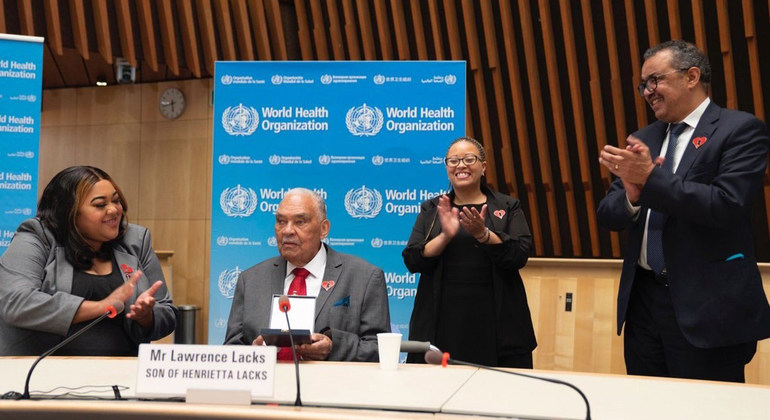This Wednesday, the UN World Health Organization’s (WHO) Director-General, Tedros Adhanom Ghebreyesus, recognized her world-changing legacy with a special award.
In 1951, while Ms. Lacks sought treatment, researchers took biopsies from her body without her knowledge or consent, and her cells became the first “immortal” cell line, now known as the “HeLa cells”.
‘Reckoning’ with injustice
Shockingly, as WHO points out, the global scientific community once hid her race and her real story, a historical wrong that Wednesday’s recognition hopes to help redress.
For Tedros, in honouring Mrs. Lacks, the UN agency “acknowledges the importance of reckoning with past scientific injustices and advancing racial equity in health and science.”
He said the award was also “an opportunity to recognize women, particularly women of colour, who have made incredible but often unseen contributions to medical science.”
Legacy
The award was received at the WHO office in Geneva by Lawrence Lacks, Ms. Lacks’ 87-year-old son.
He is one of the last living relatives who personally knew her. Mr. Lacks was accompanied by several of Henrietta Lacks’ grandchildren, great-grandchildren, and other family members.
Mr. Lacks said the family was moved to receive this historic recognition, honouring “a remarkable woman and the lasting impact of her HeLa cells.”
“My mother’s contributions, once hidden, are now being rightfully honoured for their global impact,” he said.
“My mother was a pioneer in life, giving back to her community, helping others live a better life and caring for others. In death she continues to help the world. Her legacy lives on in us and we thank you for saying her name – Henrietta Lacks.”
According to WHO, women of colour continue to be disproportionately affected by cervical cancer. The COVID-19 pandemic has also exposed the many health inequities that persist among marginalized communities around the world.
Studies in various countries consistently document that Black women are dying of cervical cancer at several times the rate of white women. Today, 19 of the 20 countries with the highest cervical cancer burdens are in Africa.
Cervical cancer strategy
The past year, which saw the 100th anniversary of Henrietta Lacks’ birth, also coincided with the launch of WHO’s Global strategy to accelerate the elimination of cervical cancer, an initiative Mrs. Lacks’ family has endorsed.
Her relatives have also joined WHO in advocating for equity in access to the HPV vaccine, which protects against a range of cancers, including cervical cancer.
Despite having been prequalified by WHO over 12 years ago, supply constraints and high prices still prevent adequate doses from reaching girls in low and middle-income countries.
As of 2020, less than 25% of low-income countries and less than 30% of lower middle-income countries had access to the HPV vaccine through their national immunization programmes, compared with more than 85% of high-income countries.
For the Assistant Director-General for Strategic Priorites and Special Advisor to the Director General, Princess Nothemba Simelela, “it is unacceptable that access to the lifesaving HPV vaccine can be shaped by your race, ethnicity or where you happen to be born.”
Reminding that the HPV vaccine was developed using Henrietta Lacks’ cells, she added: “We owe it to her and her family to achieve equitable access to this groundbreaking vaccine.”
Remarkable Contribution
As a young mother, Henrietta Lacks and her husband were raising five children near Baltimore when she fell ill.
She went to Johns Hopkins medical centre in the city, one of the few leading hospitals at the time which served African-Americans, after experiencing extensive vaginal bleeding and was diagnosed with cervical cancer. Despite treatment, she died on October 4, 1951, at only 31 years old.
During treatment, researchers took samples of her tumour. That “HeLa” cell line was a scientific breakthrough: the first immortal line of human cells to divide indefinitely, under laboratory conditions, to power research.
The cells were mass produced, for profit, without recognition to her family. Over 50,000,000 metric tonnes of HeLa cells have been distributed around the world – forming part of over 75,000 studies.
In addition to the HPV and polio vaccines, they allowed for development of drugs for HIV/AIDS, haemophilia, leukaemia, and Parkinson’s disease; breakthroughs in reproductive health, including in vitro fertilization; research on chromosomal conditions, cancer, gene mapping, and precision medicine.
Currently, they are being used in studies responding to the COVID-19 pandemic.
Teal tribute
Following the presentation of the award, the family and WHO proceeded to the shores of Lake Geneva, to watch the city’s iconic Jet d’Eau illuminate in the colour teal, the colour which marks cervical cancer awareness.
It is the first of several world monuments that will illuminate in teal between now and November 17th, marking the first anniversary of the launch of the global elimination campaign.



